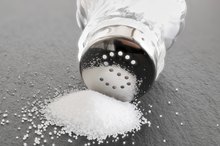What does fact checked mean?
At Healthfully, we strive to deliver objective content that is accurate and up-to-date. Our team periodically reviews articles in order to ensure content quality. The sources cited below consist of evidence from peer-reviewed journals, prominent medical organizations, academic associations, and government data.
- Appetite: Caffeine Ingestion, Affect and Perceived Exertion During Prolonged Cycling
- Appetite: Caffeine Ingestion, Affect and Perceived Exertion During Prolonged Cycling
- Psychopharmacology: Fourteen Well-Described Caffeine Withdrawal Symptoms Factor into Three Clusters
- Psychopharmacology: Fourteen Well-Described Caffeine Withdrawal Symptoms Factor into Three Clusters
- Acta Anaesthetiologica Scandanavica: A Case of Fatal Caffeine Poisoning
- Acta Anaesthetiologica Scandanavica: A Case of Fatal Caffeine Poisoning
- Linus Pauling Institute: Sodium
The information contained on this site is for informational purposes only, and should not be used as a substitute for the advice of a professional health care provider. Please check with the appropriate physician regarding health questions and concerns. Although we strive to deliver accurate and up-to-date information, no guarantee to that effect is made.
Coffee & Sodium Depletion
The Food and Agriculture Organization of the United Nations estimated 2010 United States coffee consumption at about 1.15 million tons, accounting for just over 16 percent of the global consumption 1. Along with its effects on the nervous system, coffee can affect other systems of the body including the cardiovascular and urinary systems 2. Its impact on the latter can help explain its effect on sodium levels. In extreme cases, can cause a severe sodium imbalance. However, moderate coffee is not likely to significant impact your sodium levels.
Diuretic Properties
The caffeine contained in coffee has diuretic properties that can affect levels of chemicals such as sodium. A 5-ounce cup of coffee can contain anywhere between 60 to 150 milligrams of caffeine. The more caffeine it contains, the greater the diuretic effects. Consuming coffee will lead to an increase in urine production. While mainly water, urine also contains sodium, potassium, and other compounds that can be depleted from the body. The degree of the effect of coffee will vary with the individual. Your lifestyle will also play a role in coffee's effects.
- The caffeine contained in coffee has diuretic properties that can affect levels of chemicals such as sodium.
- Consuming coffee will lead to an increase in urine production.
Effects of Caffeine
Can Drinking Coffee Cause Dry Mouth?
Learn More
Drinking caffeinated coffee may help improve your athletic performance due to its effects on the nervous system 2. A complex series of chemical reactions leads to an increase in epinephrine or adrenaline release. In effect, drinking coffee puts your body into a fight-or-flight state with an increase in heart rate and blood flow. Caffeine combined with increased physical activity can lead to additional losses of sodium from perspiration. In extreme cases, caffeine depletes your body's electrolytes and causes a serious imbalance. One study, published in "Acta Anaesthetiologica Scandanavica" in 2010, reports one case of severe caffeine toxicity that caused hyponatremia, as well as depleted potassium levels and cardiovascular dysfunction 5.
Symptoms of Low Sodium Levels
The symptoms of a sodium deficiency include headache and fatigue. Curiously, these are similar symptoms to caffeine withdrawal in individuals that regularly consume caffeinated coffee. Sodium plays a role in the most basic of life functions. A depletion therefore, can lead to serious and potentially life-threatening health consequences such as swelling of the brain, seizures and coma.
- The symptoms of a sodium deficiency include headache and fatigue.
- Curiously, these are similar symptoms to caffeine withdrawal in individuals that regularly consume caffeinated coffee.
Tips for Safe Caffeine Consumption
Low Sodium Levels and Caffeine
Learn More
Drinking coffee in moderation prevents negative effects of excessive caffeine intake. Drink other fluids, especially water, to maintain your body's fluid balance. The fluids in your body will in turn affect the concentration of chemicals like sodium for healthy body function. Limit your caffeine intake to 2 to 3 cups of coffee daily, and watch out for caffeine in other foods, including tea and chocolate.
- Drinking coffee in moderation prevents negative effects of excessive caffeine intake.
- The fluids in your body will in turn affect the concentration of chemicals like sodium for healthy body function.
Related Articles
References
- Food and Agriculture Organization of the United Nations: Coffee
- Neuroscience for Kids: Effects of Caffeine on the Nervous System
- Appetite: Caffeine Ingestion, Affect and Perceived Exertion During Prolonged Cycling
- Psychopharmacology: Fourteen Well-Described Caffeine Withdrawal Symptoms Factor into Three Clusters
- Acta Anaesthetiologica Scandanavica: A Case of Fatal Caffeine Poisoning
- Linus Pauling Institute: Sodium
- Coffee, brewed, prepared with tap water. FoodData Central. U.S. Department of Agriculture. Published April 1, 2019.
- Caffiene in coffee. FoodData Central. U.S. Department of Agriculture. Published April 1, 2019.
- McCusker RR, Fuehrlein B, Goldberger BA, Gold MS, Cone EJ. Caffeine content of decaffeinated coffee. J Anal Toxicol. 2006;30(8):611-3. doi:10.1093/jat/30.8.611
- Coffee, instant, reconstituted. FoodData Central. U.S. Department of Agriculture. Published April 1, 2019.
- U.S. Department of Agriculture. Coffee, espresso. FoodData Central. Published April 1, 2019.
- Tea, hot, leaf, black. FoodData Central. U.S. Department of Agriculture. Published April 1, 2019.
- Soft drink, cola. FoodData Central. U.S. Department of Agriculture. Published April 1, 2019.
- US Food & Drug Administration. Spilling the beans: How much caffeine is too much?. Updated December 12, 2018.
- Rogers PJ, Heatherley SV, Mullings EL, Smith JE. Faster but not smarter: Effects of caffeine and caffeine withdrawal on alertness and performance. Psychopharmacology (Berl). 2013;226(2):229-40. doi:10.1007/s00213-012-2889-4
- Freedman ND, Park Y, Abnet CC, Hollenbeck AR, Sinha R. Association of coffee drinking with total and cause-specific mortality. N Engl J Med. 2012;366(20):1891-904. doi:10.1056/NEJMoa1112010
- Voskoboinik A, Kalman JM, Kistler PM. Caffeine and arrhythmias: Time to grind the data. JACC Clin Electrophysiol. 2018;4(4):425-432. doi:10.1016/j.jacep.2018.01.012
- Papakonstantinou E, Kechribari I, Sotirakoglou Κ, et al. Acute effects of coffee consumption on self-reported gastrointestinal symptoms, blood pressure and stress indices in healthy individuals. Nutr J. 2016;15:26. doi:10.1186/s12937-016-0146-0
- The American College of Obstetricians and Gynecologists. Moderate Caffeine Consumption During Pregnancy. Committee Opinion: 462. Published August 2010.
- Drake C, Roehrs T, Shambroom J, Roth T. Caffeine effects on sleep taken 0, 3, or 6 hours before going to bed. J Clin Sleep Med. 2013;9(11):1195-200. doi:10.5664/jcsm.3170
- Alstadhaug KB, Andreou AP. Caffeine and primary (migraine) headaches-friend or foe?. Front Neurol. 2019;10:1275. doi:10.3389/fneur.2019.01275
- Lara DR. Caffeine, mental health, and psychiatric disorders. J Alzheimers Dis. 2010;20 Suppl 1:S239-48. doi:10.3233/jad-2010-1378
- National Institute of Diabetes and Digestive and Kidney Diseases. Eating, diet and nutrition for GER and GERD. Updated November 2014.
- Jiwani AZ, Rhee DJ, Brauner SC, et al. Effects of caffeinated coffee consumption on intraocular pressure, ocular perfusion pressure, and ocular pulse amplitude: A randomized controlled trial. Eye (Lond). 2012;26(8):1122-30. doi:10.1038/eye.2012.113
- Mitchell DC, Knight CA, Hockenberry J, Teplansky R, Hartman TJ. Beverage caffeine intakes in the U.S. Food Chem Toxicol. 2014;63:136-42. doi:10.1016/j.fct.2013.10.042
Writer Bio
Chris Dinesen Rogers has been online marketing for more than eight years. She has grown her own art business through SEO and social media and is a consultant specializing in SEO and website development. Her past work experience includes teaching pre-nursing students beginning biology, human anatomy and physiology. Rogers's more than 10 years in conservation makes her equally at home in the outdoors.








